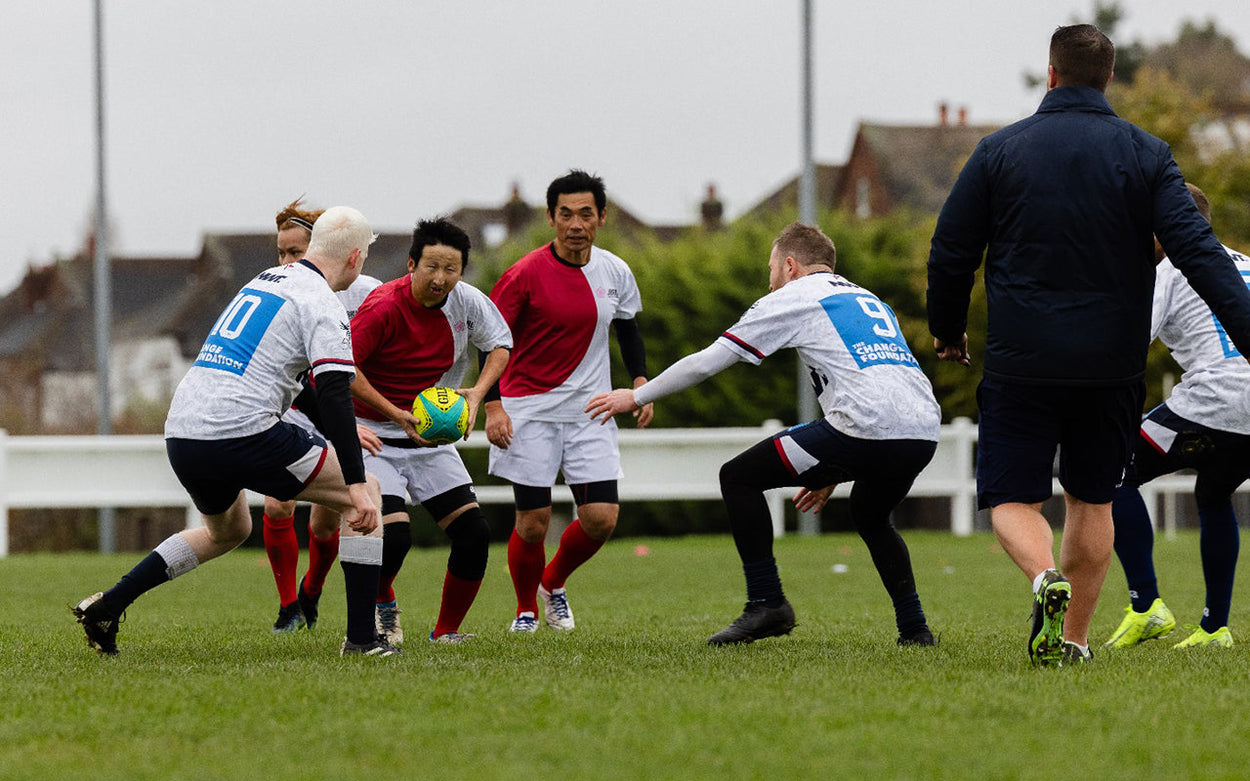With 15 June approaching like Rory Underwood with a clear wing and the try line in sight, we chatted to a group of VI rugby players about the joys of the game and what Father’s Day means to them.
Tell us a bit about the team…
Jack: We've got a massive age range of players on the visually impaired rugby team. From people as young as 11 and all the way up to, dare I say it, 50-odd. The fact that the game is quite fast-paced means that it's available for anybody really. There's lots of skill involved as well, like we really benefit from having some of the more experienced guys that are a bit older helping younger players with the rules of the game and the skills, etcetera.
In terms of people's background, we have a real mix of people that have come from playing lots of rugby before. We've got a few people that have come from rugby union background – including myself, I played rugby union growing up – a couple that have played rugby league, and that's mixed in with a lot of hybrid athletes. So people that have played other visually impaired sports before, like baseball, cricket, football, and that come to rugby as a new sport for them.
The blend of people that have a rugby background and don't is really interesting and exciting. We've got some athletes from athletics and mixing them in with people from rugby is really interesting. Obviously, people have different skill sets and the better teams blend those things together.
Can you explain the main adaptions in VI rugby?
Aaron: So, visually impaired rugby is a seven-a-side touch version of the game. The pitch is about three-quarters the size of a full-size rugby pitch. A tackle is made by a one-handed touch to the body. A try is scored by touching the ball down over the try line, as in a normal game of rugby. Scrums and line-outs are uncontested.
After getting tackled, a player must put the ball down between their legs, a bit like in rugby league, and after six tackles, the ball gets turned over. There's no kicking in visually impaired rugby, and other than that, it's like a standard game of rugby.
If someone was considering playing VI rugby, what would you say to encourage them on to the pitch?
Hayden: Well, if you're already thinking about playing, I say just go for it. All the people we play with, all my teammates, we have a great time every time we're out on the training session. It's hugely rewarding to be fit and playing with people who are like-minded and have similar conditions to yourself. It's a super supportive atmosphere and it's just loads and loads of fun.
What does Father’s Day mean to you?
Jack: You know, Father's Day is a really nice time of year. It usually involves, for me, having a barbecue with my dad and his dad as well. It's nice to get the family together to celebrate each other. A special thing for me is that my dad played rugby, so we have that connection together. We've spent many a Sunday morning going to rugby training together, and then more recently we've watched a lot of international games together. It's something that really bonds us, and that's great.
Andrew: Father's Day for me is just about celebrating a relationship between me and my dad, just sort of having that person in your corner that you can call any time if you need any help. Normally with life admin like “How do I pay this bill?”, it's sort of just celebrating the little things from being always on hand. But yeah, Father's Day for me just generally means spending some special time with your dad, taking him for a beer and spending some time celebrating that fantastic relationship we both have.
What do you like to do for Father’s Day with your family?
Jonathan: Well, I think it'd be fair to say that Father's Day in our household usually involves a barbecue and a healthy serving of red wine.
Aaron: On Father's Day, obviously the main thing is I like to spend it with my dad and with my family. It will usually involve spending time with my family, maybe doing something that my dad enjoys or something that we both enjoy. Sometimes we'll go and watch a rugby game, sometimes we might go for a walk, play a round of golf. And yeah, it's just about enjoying time with my dad and family and having a good time together.
Hayden: So, my dad doesn't really like celebrating Father's Day because he doesn't like celebrating anything about himself. But when I can do, I like to get him down to a restaurant or a pub for a meal and yeah, generally just relaxing at home, not doing a lot. Hopefully it's sunny. Anything that we can do to have a good time and spend some time together, it works for us.
What are your tips for making Father’s Day accessible?
Jack: I think, for me, I think it's having open conversations. I think sometimes people that are visually impaired can shy away from things that they need help with and things that they can't access. And I think being transparent about that: A. Makes your life easier, and B. You'll find that you build better relationships with people. You know, your family, your father specifically, but that could be advice for anybody really.
So yeah, in terms of making Father's Day more accessible, I'd say having open conversations with people about your condition, about things you need help with, things that you can manage by yourself. And that hopefully, through going through that process, you build better bonds and enjoy more.
Andrew: I suppose Father's Day has always been kind of accessible for me. I guess it's going to sound a bit weird, I guess I haven't had to make any differences to make Father's Day accessible because obviously my dad's been so sort of switched on about visual impairments and being VI. We don't have to change anything to make it accessible.
Any tips for blind and partially sighted people who are about to become dads for the first time?
Jonathan: Well first and foremost, many congratulations on a new arrival into your household. I think it would be difficult for me to kind of give any solid advice for you dads because I had 18 years of practice before my sight loss impacted on me.
What I will say though for those of you that are experiencing sight loss later in life is remember it's not just your diagnosis but it's a diagnosis around your whole family so be really mindful of how that news might impact on them.
Aside from that I'd say you're about to embark upon the most incredible journey so good luck, and enjoy it because before you know it they'll be leaving home.
Finally, where can people learn more about your team?
Jack: So, there's two main places that you can go to find more information about VI rugby. First, the Change Foundation website. The Change Foundation is the charity that launched the game back in 2015, and there's some really good information on there about the game, previous tours and things like that.
Second, our Facebook and Instagram pages, under our handle @VIRugby. We have loads of video clips and images of previous training sessions, previous tournaments, as well as player interviews and player profiles and things like that.
[Head to our Father's Day collection to pick up one of our inclusive Father's Day cards, an audible rugby ball, or another thoughtful gift.]




